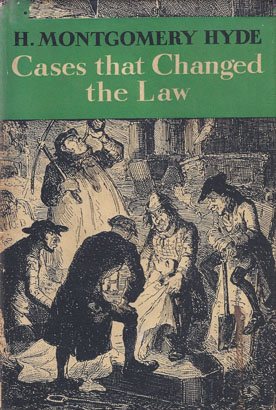
Out of Print
The Cases which appear in this volume range from the years 1728 to 1931. Collectively they involve the setting in motion of the machinery of the law with varying and usually dramatic results. And, like so many legal dramas, each one abounds in human interest.
The first six here described are of trials which led to an alteration in the substantive law of the country. Three of them, at least, are well known-Burke and Hare, Adolf Beck and the Royal Mail Company¬and the proceedings of these trials are already available in book form. W. T. Stead's case is also widely known, though the only account of his trial exists in contemporary press reports.
The remaining two, Caroline Norton and the Flowery Land pirates, though equally important, are now largely forgotten; they too are entombed in old newspaper files. All six trials are presented in the light of the fact that they produced changes in the law through the passing of Acts of Parliament.
Next come seven Irish mysteries. It may be objected by readers that some of these are not really mysteries at all. In Kerry, for instance, there are people who will tell you what they are certain is the truth about the Danish Silver Robbery; in Donegal they may claim to know who killed Lord Leitrim; and in Dublin you may possibly hear talk purporting to reveal the identity of the thief who stole the Irish Crown Jewels.
However, with the exception of the betrayal of Lord Edward Fitzgerald, none of these mysteries has been officially solved, and I think we must regard them as lacking solution until proofs are advanced which place the questions posed beyond all reasonable doubts.
I have also described six famous Irish trials. Three are concerned with charges of murder; the other three deal with cases respectively of treason, breach of promise, and forgery. They all command attention for one reason or another.
Finally, there are four cases involving the personality and character of Oscar Wilde. I have already given elsewhere a full and detailed account of the three sensational trials in which Wilde was the central figure at the Old Bailey in 1895*. The first case presented here occurred ten years earlier. It concerned a dispute arising out of the decoration of Wilde's house in Tite Street and it was settled before it had passed its interlocutory stages in the Law Courts. The other three cases reached the courts after Wilde's death, and raised literary issues. They revolved round Mr. Arthur Ransome's Oscar Wilde: A Critical Study, the controversial Salome, and a work entitled For Love of the King which has been attributed to Wilde.These cases, which are based on hitherto unpublished or inaccessible material, throw interesting sidelights on Wilde's life and writings. In the words used by that author in a memorable passage in De Profundis, "all trials are trials for one's life, just as all sentences are sentences of death."
*The Trials of Oscar Wilde. Edited by H. Montgomery Hyde (Notable British Trials), 1948.